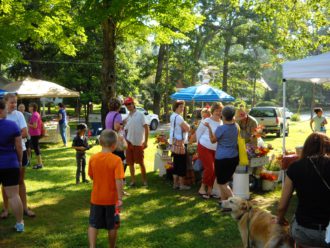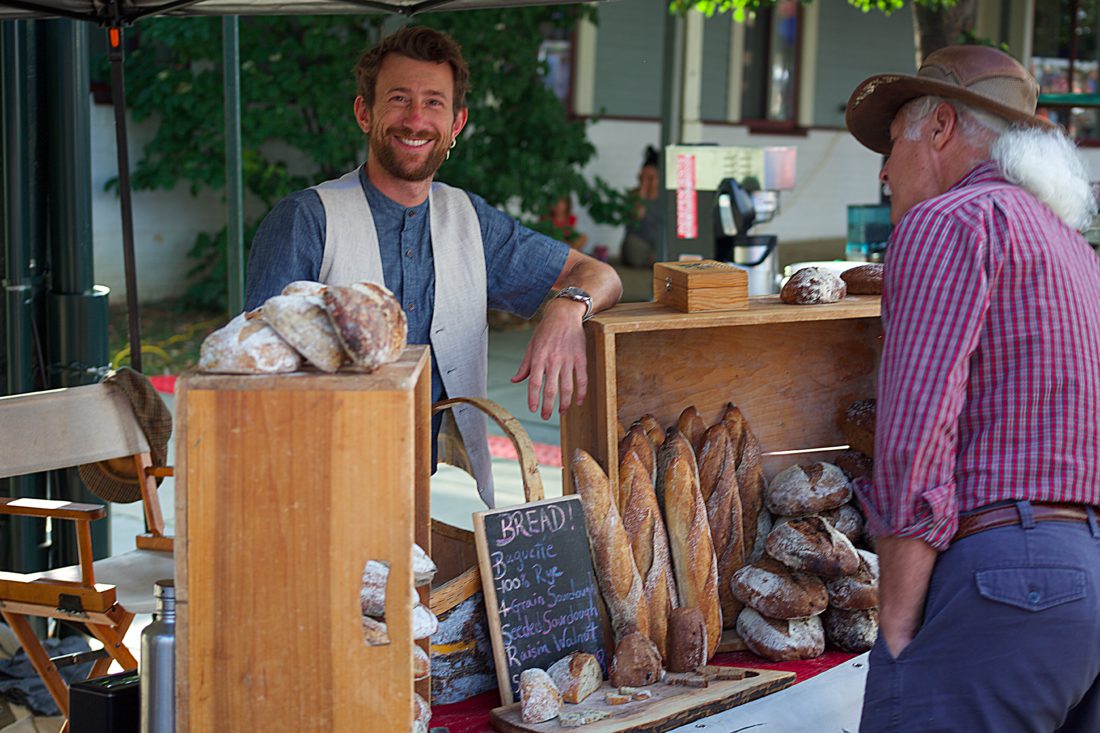It’s just past sunrise on the last Saturday in April; the sky is clear, and the air delivers a wake-up chill as morning light replaces streetlights in downtown Asheville. Market Street has been closed between Woodfin and Walnut streets since 6 a.m., clearing the way for the weekly ritual of staging the Asheville City Market, where between 8 a.m. and noon, nearly 50 farmers, bakers and makers will sell their wares from 10-by-10-foot spaces.
Market manager Mike McCreary, clipboard in one hand, cellphone in the other, maintains a brisk clip as he traverses from one side of the street to the other, steering vendors arriving in their trucks to their assigned spaces.
Assistant manager Trish Tripp is setting up the Appalachian Sustainable Agriculture Project tent, from which she will serve as chief information officer, selling the $5 tokens many regular shoppers prefer for commerce. (The Asheville City Market and the South Asheville Market in Biltmore Park Town Square on Wednesday afternoons are operated by ASAP.)
Vendors place tents, tables and signage. Produce picked the night before is removed from bins, flats of herbs and vegetable starts sorted, loaves of bread and blocks of cheese cut for sampling, coffee brewed, handcrafted earrings hung from display frames.
Joe Evans, manager of Olivette Farm, weighs and bags mixed lettuce greens. Chue Lee, who with husband Tou owns Lee’s One Fortune Farm in Marion, places the first strawberries of the season between stacks of the Asian greens they are known for. Danny McConnell of McConnell Farms has bundles of crisp asparagus stalks prominently displayed.
The minute the market opens, Asheville resident Annette Cocke makes her weekly produce purchase from McConnell. “I’m here early for Danny’s asparagus,” she says. “He’ll have the best berries later in the season.”
Just over a mile away on the campus of UNC Asheville, on a curve of pavement under a canopy of spring-leafed trees, market manager Shay Amber directs a similar scenario for the North Asheville Tailgate Market. The area’s oldest outdoor market started its 39th season on April 6 with about 50 vendors.
In Burnsville, Cheri Lee put up tents on the town square for the first day of the Yancey County Tailgate Market’s 27th season — with more vendors on opening day than at the market’s peak last year. The Black Mountain Tailgate Market began its 25th season May 4. Manager Joan Engelhardt says it has grown from two vendors in 1994 to about 40 now.
Market models
As interest in local, healthy, farm-to-table eating and artisanal food products has mushroomed, so have area tailgate markets in both size and number. The 2019 Local Food Guide published by ASAP lists 11 markets in Buncombe, Madison and Yancey counties alone. Among them, they cover several Asheville neighborhoods and every day of the week except Monday and Thursday. (The WNC Farmers Market on Brevard Road is open daily and reserves one shed for grower-only vendors.)
While each tailgate market serves its own area and demographics, they all adhere to roughly the same model, policies and procedures, the logistics of which begin well before opening day and continue through the season. Amber says the North Asheville market is the “exclusive producer-only” market in Asheville, though other managers dispute that, and almost all of the online application forms for local markets clearly state “producer- or grower-only” criteria for acceptance.
McCreary acknowledges there are some exceptions at Asheville City Market. “All of our farm vendors are grower-only, but we have some flexibility when you get into other categories,” he says. He lists coffee, seafood and pasta as three examples. “We have a pasta vendor whose pasta is made in Charleston,” he says. “At this time there is not a local pasta maker. If we had a local pasta producer who wanted to sell, they would come in, and I would have to decide if it was in the best interest of the market to also have this pasta from farther away.”
With most tailgate markets operating April or May through November or December, the application process for the regular season typically opens in February and cuts off for member status about 30 days later. Day vendors can apply throughout the season for week-by-week spots.
Joining the club

Benefits of being a member are financial — members pay an annual fee and anywhere from nothing to a nominal amount per market — and guaranteed placement. “It’s good for vendors and shoppers for us to be in the same spot every week,” says Jonathan Price, owner of Crust Never Sleeps, who sells his sourdough loaves as a member of Asheville City Market and West Asheville Market.
Individual markets decide how many vendors of each particular product and category — member and day — they accept. Physical space is the primary determinant of the mix.
Most spaces are given to members — the North Asheville Market has only eight spaces for day vendors available per week. Indeed, the seeds for several of the in-town tailgates were planted because, with North Asheville members coming back year after year, there were limited options for other farmers to reach consumers. As one vendor noted wryly, “Somebody has to die before you can get membership at North.”
The West Asheville Market bylaws and budget cap the number of members at 25, but its fairly spacious location in the Grace Baptist Church parking lot on Haywood Road can accommodate as many as 50 booths, so often day vendors and newcomers gravitate there.
There are typically three to four categories of product: farmer and grower (produce, meat, eggs, plants, herbs); value-added foods (baked goods, cheese, fermented foods, spices, jams); body care products and crafts. In every market, farmers receive the highest percentage of spaces — 60-80% — with the remainder doled out to other categories.
Mixing it up
“Product mix management,” as McCreary calls it, is an art and a balancing act that requires knowledge of customer base and sales patterns, and depends on the size and hours of the market. As he sees it, the manager’s main job is to do what’s in the best interest of the market.
“Exclusivity can be a problem,” he says. “If I have an egg seller who wants to be the only egg seller, but they sell out at 10 a.m. and the market goes to noon, that is not in the best interest of the market.”
It’s imperative to monitor supply and demand. “Before I let a new bread vendor in, I check to see how our current bread vendors are doing,” says McCreary. “One year we had 13 bakers, but they were not making the same product, and they all did well.”
Like Price, Nathan Morrison sells his Simple Bread at the Asheville City Market and the West Asheville Tailgate Market plus the Weaverville market. He has no concerns about the competition. “Why would I say no to more bread vendors?” he asks rhetorically. “My bread is a certain kind of bread, Jonathan makes another kind, some people make gluten-free. If someone’s bread is not good, they won’t be there long. It’s quality more than quantity.”
Though for Engelhardt at the Black Mountain market, quantity matters. “This year I had six people wanting to sell mushrooms,” she says. “If I give six of my 39 spaces to mushrooms, we’d lose something else. This is a tailgate market, not a mushroom market!”
Product mix management and knowing each market demographic is also key for farmers who work in multiple markets. Price and Morrison bring fewer loaves to West Asheville than City Market because it opens for a shorter time frame. McConnell sends the bulk of his produce on Saturdays to the North Asheville stall and focuses at the City Market more on value-added items like jams and jellies that the tourists who flow through downtown can take home with them — or eat on-site, like the fresh, hot doughnuts he sells by the six-pack.
All the market managers agree that it’s the early birds who get the worm — and the mushrooms, strawberries, asparagus and arugula. “We have some regulars that come early and help us set up. But that is their ruse to get in and have first pick at the produce,” Cheri Lee says of her Yancey County shoppers.
Engelhardt agrees. “Our hard-core regulars come early, buy their stuff and leave. We’re getting lots of young families the last couple of years who shop, hang out, listen to music and let their kids play under the trees. Around 11:30 we get the people who have just woken up and want to know where the arugula is. People, you can’t show up half an hour before we close and expect to find arugula!”




Before you comment
The comments section is here to provide a platform for civil dialogue on the issues we face together as a local community. Xpress is committed to offering this platform for all voices, but when the tone of the discussion gets nasty or strays off topic, we believe many people choose not to participate. Xpress editors are determined to moderate comments to ensure a constructive interchange is maintained. All comments judged not to be in keeping with the spirit of civil discourse will be removed and repeat violators will be banned. See here for our terms of service. Thank you for being part of this effort to promote respectful discussion.